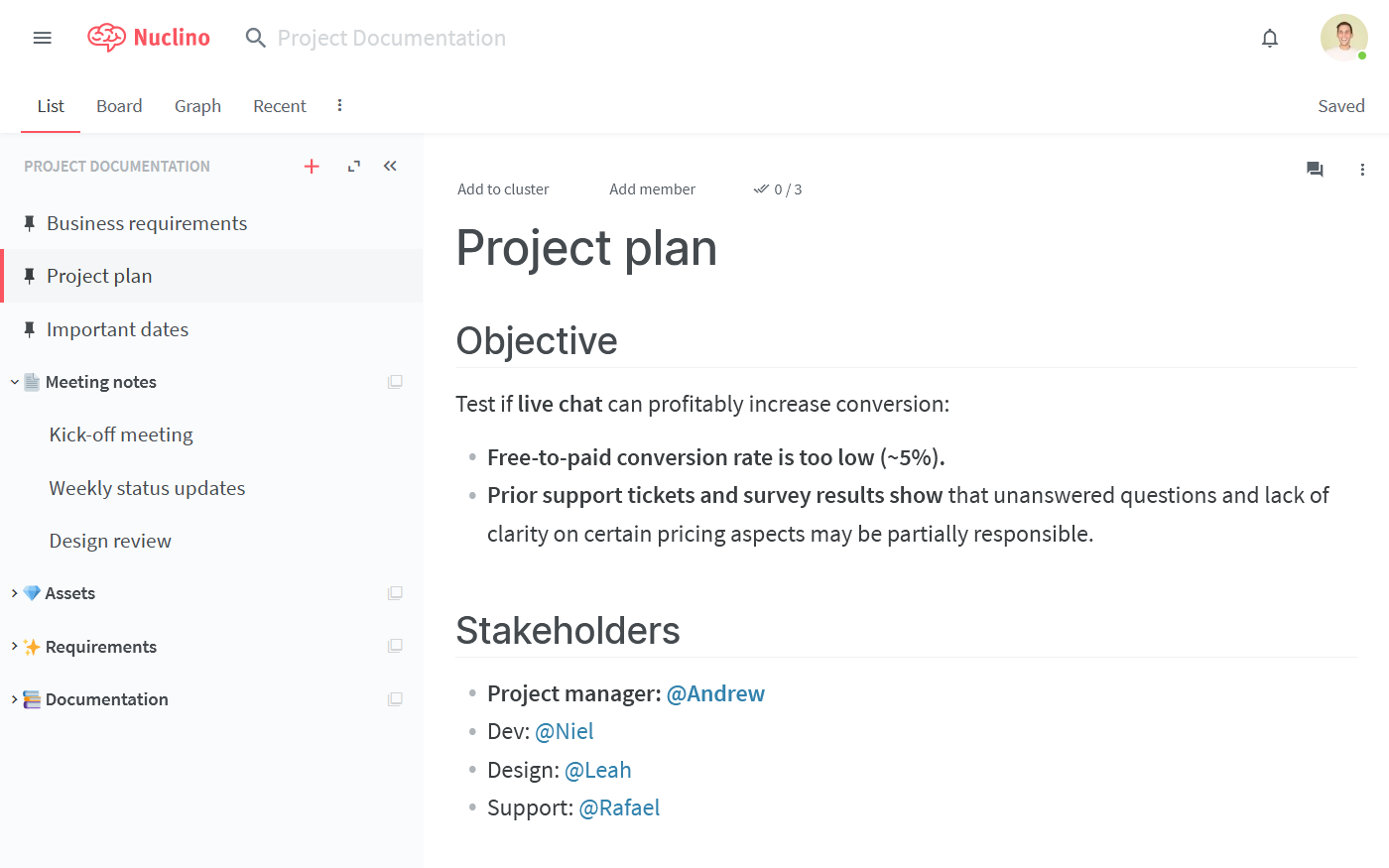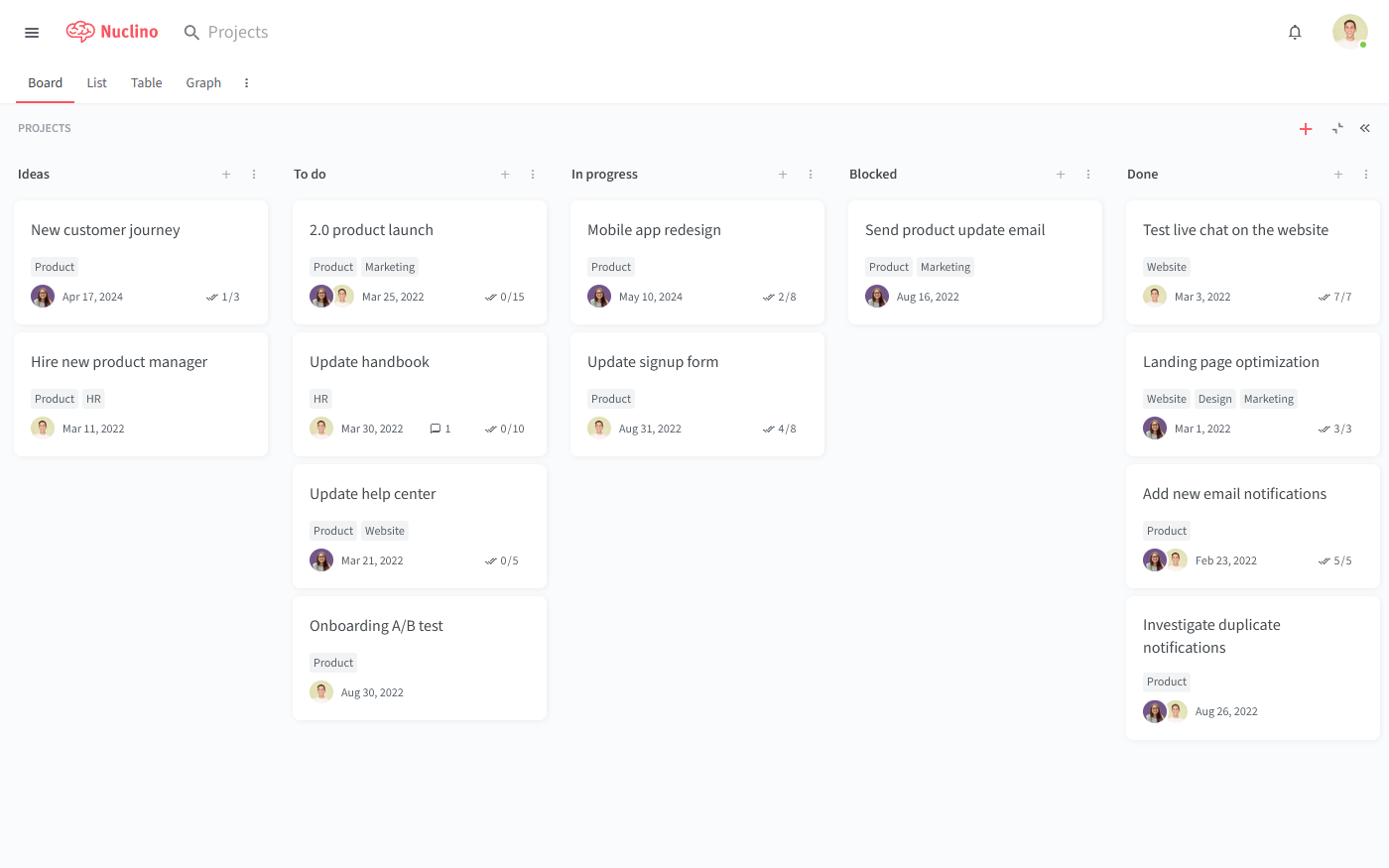The Ultimate Guide to Project Management
Learn how to keep your projects on track and deliver results on time.
Project management skills are essential to achieving business objectives. Whether your job title is "project manager" or not, you will likely need to manage numerous projects throughout your career. And whether these projects successfully deliver results while meeting the deadlines and staying within your budget depends on how you manage them.
But what does project management actually entail? In this guide, we will cover the fundamentals of planning, tracking, and delivering projects.
What is a project?
Before going into how a project should be managed, it's important to understand what a project is.
A project is a temporary endeavor undertaken to produce a certain outcome. To put it simply, it's anything that has a start, a finish, and produces a deliverable. Projects differ from routine tasks and day-to-day business operations:
A project has a unique goal.
It is a new undertaking that is not repetitive.
It is constrained in terms of time and resources.
It is often executed by multiple stakeholders.
Launching a new product or service, entering a new market, or revising a business process are all projects, while responding to customer queries, fixing bugs, or updating internal documentation are routine business operations.
What is project management?
Project management is the organization and planning of all tasks and resources required to achieve project goals. It's an umbrella term that covers a number of related disciplines, including task management, resource management, risk management, and more.
Project management involves a number of activities:
Proposing the project
Planning the project
Assembling and managing a team
Prioritizing and assigning tasks
Managing the timeline
Managing the budget and other resources
Documenting the process
Project proposal
In many cases, before the project can go forward, it needs to be formally approved by management. Casually pitching your idea to your supervisor is often not enough – you need to create a formal, structured document that explains why your initiative is worth investing resources into.
Learn how to write a project proposal.
Project planning
After your project gets the green light, you can move forward and start planning its implementation.
Decisions made during the initial planning phase often determine the fate of the entire project. It may be tempting to jump straight into it and figure things out as you go along – but it's vital to remember that poor planning is one of the main reasons why projects fail.

To ensure that doesn't happen, the project manager writes a project plan. It is a living document that serves as a roadmap and a single source of truth for the team, capturing all decisions and facilitating communication among project stakeholders.
Learn how to create a project plan.
Project collaboration
Delivering a project is rarely a one-man job. Most successful projects rely on the collective effort, skills, and knowledge of a cross-functional, cohesive team. But what does it actually entail?
Discover the best project collaboration tools.
Project documentation
A crucial aspect of managing a project is to thoroughly document it.
Project documentation helps clarify project expectations and objectives, plan and assign resources, and ensure that all stakeholders are informed about the progress. It includes a variety of documents, from project plans and business cases, to requirement sheets and project status reports.
Learn how to write project documentation.
Project management tools
The tool you choose to manage your tasks can often make or break your project. A slow and unintuitive project management tool can lead to missed deadlines, miscommunication between team members, and important tasks slipping through the cracks.

The only way to know with certainty if a particular tool will be a good fit is to try it out in your team. Read on to learn more about your options.
- Best project management tools
- Best project planning tools
- Best simple project management software
- Best Agile project management tools
- Best project management software for small business
- Best marketing project management software
- Best creative project management software
- Best design project management software
- Best free project management software
- Best task management software
- Best issue tracking software
- What is a Kanban board?
- Best Kanban tools
- Best Kanban board software
- Best Trello alternatives
- Best Jira alternatives
- Best Asana alternatives
- Best Basecamp alternatives
- Best Notion alternatives
- Best ClickUp alternatives
- Best Wrike alternatives
- Best Monday alternatives
- Best Airtable alternatives
- Best HacknPlan alternatives
- Best Zenkit alternatives
- Best nTask alternatives
- Best Todoist alternatives
- Best Taskade alternatives
- Best ProofHub alternatives
- Best Microsoft Loop alternatives
- Best Microsoft Planner alternatives
- Best Microsoft Project alternatives
- Trello vs Asana: A Side-by-Side Comparison
- Monday vs Asana: A Side-by-Side Comparison
- Trello vs Monday: A Side-by-Side Comparison
- Asana vs Jira: A Side-by-Side Comparison
- ClickUp vs Notion: A side-by-side comparison
- Trello vs Jira: A side-by-side comparison
- Confluence vs Jira: A side-by-side comparison
- Notion vs Trello: A side-by-side comparison
- Notion vs Asana: A side-by-side comparison
- ClickUp vs Trello: A side-by-side comparison
- Basecamp vs Trello: A side-by-side comparison
- Notion vs Jira: A side-by-side comparison
- Confluence vs Trello: A side-by-side comparison
- Notion vs Basecamp: A side-by-side comparison
- Microsoft Planner vs Trello: A side-by-side comparison
- Taskade vs Notion: A side-by-side comparison
- Asana vs Basecamp: A side-by-side comparison
- MeisterTask vs Trello: A side-by-side comparison
- HacknPlan vs Trello: A side-by-side comparison
- Codecks vs Trello: A side-by-side comparison
- ClickUp vs Asana: A side-by-side comparison
- ClickUp vs Jira: A side-by-side comparison
- Notion vs Todoist: A side-by-side comparison
- nTask vs Asana: A side-by-side comparison
- Confluence vs Asana: A side-by-side comparison
- Zenkit vs Notion: A side-by-side comparison
- Notion vs Monday: A side-by-side comparison
- ClickUp vs Basecamp: A side-by-side comparison
- Favro vs Trello: A side-by-side comparison
- Trello vs Todoist: A side-by-side comparison
- ClickUp vs Monday: A side-by-side comparison
- Workflowy vs Notion: A side-by-side comparison
- Linear vs Jira: A side-by-side comparison
- Wrike vs Asana: A side-by-side comparison
- Wrike vs ClickUp: A side-by-side comparison
- ClickUp vs Todoist: A side-by-side comparison
- Microsoft Planner vs Asana: A side-by-side comparison
- Microsoft Planner vs Jira: A side-by-side comparison
- Wrike vs Trello: A side-by-side comparison
- Asana vs Todoist: A side-by-side comparison
- Redmine vs Jira: A side-by-side comparison
- Asana vs Microsoft Project: A side-by-side comparison
- Linear vs Notion: A side-by-side comparison
- Basecamp vs Monday: A side-by-side comparison
- Basecamp vs Jira: A side-by-side comparison
- Bugzilla vs Jira: A side-by-side comparison
- Motion vs Notion: A side-by-side comparison
- Wrike vs Jira: A side-by-side comparison
- YouTrack vs Jira: A side-by-side comparison
- Azure DevOps vs Jira: A side-by-side comparison
- Rally vs Jira: A side-by-side comparison
- Wrike vs Basecamp: A side-by-side comparison